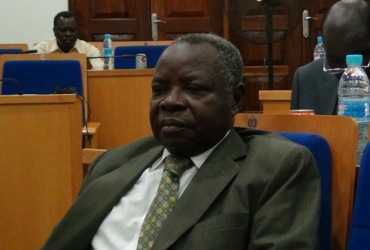Suspension of ministers on corruption charges not politcally motivated, presidential source
June 28, 2013 (JUBA) – A source in the office of South Sudan president, Salva Kiir has denied allegations that the recent suspension of two senior ministers over a corruption-related case, was politically motivated.

Last week, Kiir relieved finance minister Kosti Manibe and his cabinet affairs counterpart, Deng Alor, lifting their immunities so they can be investigated over the request and transfer of $7 million to a private company without knowledge or authorisation of the president or cabinet.
On Monday, however, Manibe responded to his suspension telling the UN-sponsored Miraya FM that the case against him was “political”.
But presidential source told Sudan Tribune that there was a lot of “misinformation and claims” about the president’s decision to suspend the duo.
“He [Kiir] was not targeting of any [of] these ministers”, the source said.
“They [ministers] were actually the closest cabinet members to him. You can tell this by the period of service in the government. They have never been left out in any cabinet changes. This shows the level of trust the president had in them”, he stressed.
The only reason for their suspension was to establish the truth behind request and the approval of the money”, the source, who works in the president’s protocol department, told Sudan Tribune.
On his recent trip to Botswana, Kiir stated that he was only interested in getting a clear reason and explanation on why the money was requested and transferred without going through the relevant channels.
The process of suspending the two ministers, the official further revealed, started in February, but the president opted not to take action because he wanted the issue to be settled through administrative channels.
“But the people involved failed to show an understanding and instead went as far as insulting him in private meetings, thinking that he (the president) would not get the information”, he said, and blamed the two ministers for having shot themselves in their feet.
“The are actually the ones who made the matter worst and they should now reap what they sow”, added the source.
BRIBES FOR CONTRACTS
Angelina Chol, a local businesswoman in the country’s capital Juba, told Sudan Tribune that she believes her unwillingness to offer brides has hampered her attempts to win government contracts, despite being able to meet requirements.
She said she had applied to supply fuel, stationeries, furniture and catering services to government bodies, but allegedly refused to to bribe officials involved in the procurement processes at various institutions.
Chol, who owns a hotel and five restaurants in Juba, employs 46 South Sudanese nationals and four foreign workers who assist her in writing proposals and applying for government projects.
“We look for those who can do what they know. We ask you what you can do best and assign you. If you say for example that you know how to prepare local food or a sauce to the extent that it attracts customers to our restaurants, then we hire you immediately. So we look at what one can do best. And the majority of the people we have hired are South Sudanese from different communities because our clients do not come from one ethnic group”, Chol told Sudan Tribune on Thursday at Juba town.
One of the main problems facing her businesses is getting hard currencies to enable her buy food items from neigbouring countries like Kenya and Uganda, she said.
“There are things that we buy locally and there are things we bring in from Kenya and Uganda. Things like construction materials, beer and other beverages require hard currencies which are difficult to get because of bureaucracy in banking system”.
Chol says she runs other business projects, which deal with supplying furniture to government and private institutions, after winning bids to supply fuel, stationery and catering services for workshops and conferences by international relief organisations, government agencies or individual groups.
She claimed most of the government contracts meant to be given to the local companies are presently awarded to the foreign companies allegedly because of bribery.
The practice of bribing people to get government contract is rapidly growing deep roots in the South Sudanese economy.
Her exasperation is shared by many South Sudanese who believe corruption in the new nation has worsened, since austerity measures were introduced last year. This follows last year’s oil dispute with Sudan that deprived the young developing nation of 98% of its income.
(ST)
